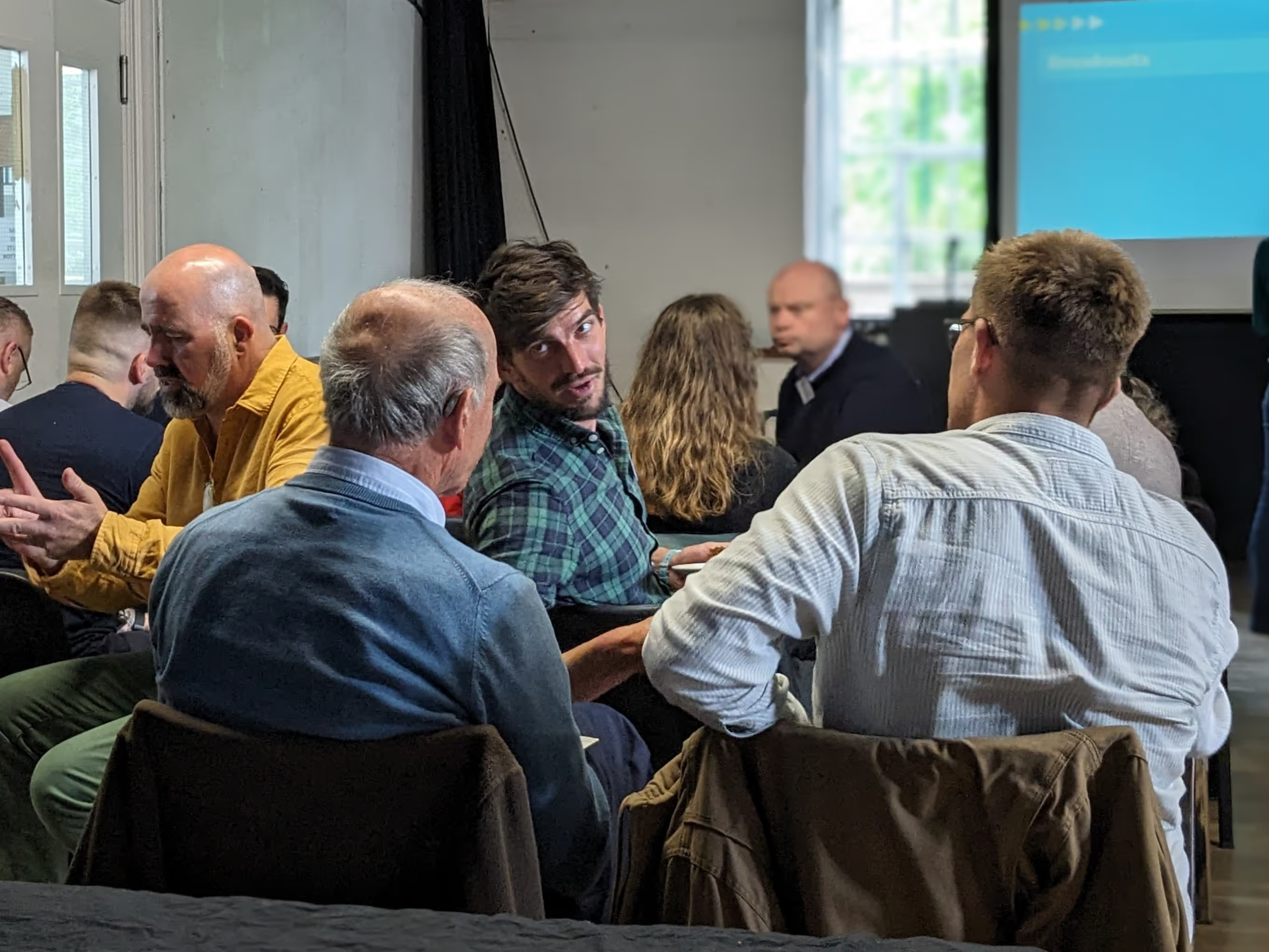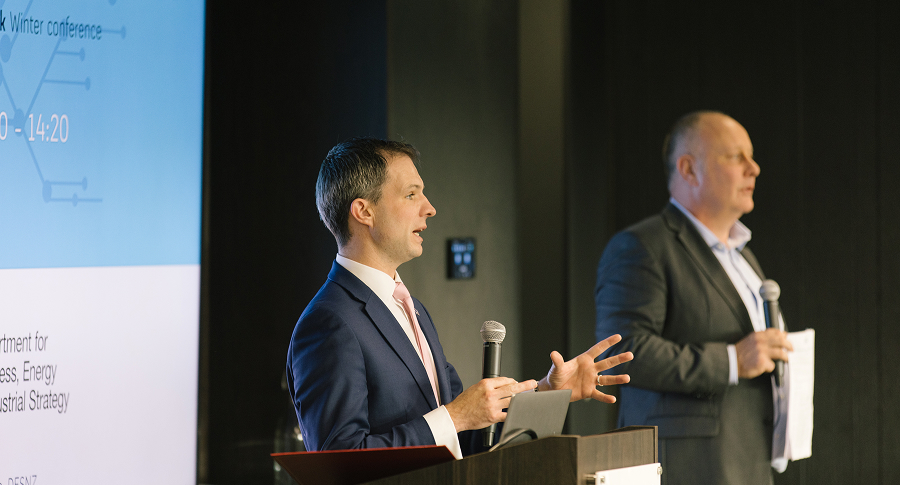In 2024, National Grid and Regen hosted four in-person community energy forums. Here, Robbie Evans looks at the standout moments and discussion points from the sessions in Exeter, Leicester, Birmingham and Swansea.

In 2024, National Grid and Regen hosted four in-person community energy forums. Here, Robbie Evans looks at the standout moments and discussion points from the sessions in Exeter, Leicester, Birmingham and Swansea.

These events form part of a series of six events (two online and four in-person) that Regen is delivering for NGED as part of its programme of community energy support. In response to asks from community energy organisations and the calling of a general election, the first two sessions focused on the topics of partnering with local authorities and businesses, progressing retrofit and heat decarbonisation, community engagement and taking a solutions-led approach to some of the barriers facing the sector. The agenda for the latter two events was formed both from previous event feedback and wider changes going on in the sector, such as the formation of GB Energy and proposals around the Local Power Plan. This blog post summarises the main insights from the in-person events.
The first presentation of the day in Exeter came from Marianne Brown, communications and community engagement manager at Bristol Energy Cooperative (BEC). As the most recent winners of Regen’s Green Energy Award for a Community Initiative, Marianne gave a rundown of some of the key partnerships that have been the foundation of the success of BEC’s giant solar arrays on the roof of the Bristol Beacon and Bottle Yard 2.
This included detailing the relationships built with building contractors, the building owners (in the Bristol Beacon’s case, Bristol City Council) and legal advisers. The Bristol Beacon’s solar array has become a key touchstone for developers and local authorities alike as a demonstration of the social value that can be achieved in the process of revitalising one of the city’s iconic venues. Through the Centre for Sustainable Energy’s ‘Future Energy Landscapes’ work, BEC also focuses on building partnerships with local residents and local climate groups to tackle how they might want to incorporate renewables into their local area.
This presentation was followed by two engaging breakout sessions on the same topic, which saw a range of discussion from how to deal with external commercial organisations that might not be as open to collaborating, to the need for greater coherence and collaboration between the Distribution Network Operator’s plans, the local authority strategies for energy and the community energy input into this.
In Leicester, Ben Dodd, the director of Green Fox Community Energy, delivered a presentation and workshop on the Leicestershire CAN (Collaborate to Accelerate Net Zero) project. His session delved into this partnership project, discussing how it will set out a route map for net zero in the county and will involve, among other things, the development of a Local Area Energy Plan (LAEP) and the growth of community energy projects in the region.
The associated workshop highlighted the importance of advocacy, awareness-raising and leveraging community assets such as roofs of community-owned buildings for solar installations. Suggestions for how local authorities with limited funds can support community energy included permitting renewable installations on local authority-owned buildings and helping community groups access grants. The role of public meetings in gathering interest and initiating projects was emphasised, as was the potential for community benefits from larger developments.
One of the standout stories from Swansea was Gwyrdd Bangla, a collaboration between Ynni Teg and the Bengal Dragons. The project works around the challenges of grid capacity that have been blocking generation projects and instead focuses squarely on community needs. It directly tackles the impact of the climate crisis and high energy costs on the Pakistani and Bangladeshi communities of South Wales, providing energy storage, solar PV and electric vehicle charging points across 12 community buildings, including mosques.
A panel on shared ownership in Wales brought forward innovative financing and collaboration models, and the importance of amplifying and quantifying the wider economic benefit of shared ownership. One example given was that of the difference between a typical community benefit fund of £5,000 per MW from a private developer, versus the £43,000 per MW that Awel Amen Tawe's community wind farm recirculates locally.
Representatives from the Welsh government highlighted how the wave of energy policies announced over recent years are intersecting at a national and local level, while the newly formed Ynni Cymru outlined its growing suite of resources "from grants to toolkits" to help communities unlock their energy potential.
In Exeter, Kate Royston of Tamar Energy Community, with support from Tara Bower of Exeter Community Energy, ran through the good work that the Devon Community Energy Network (DCEN) has been doing over the last 13 years, and some of the keys to its success as a network. Kate then covered the extensive retrofit work done by community energy organisations in the South West and touched upon a few of the current challenges around PAS2035 and Trustmark.
The following breakout session on this topic saw a detailed conversation on the debate around ‘Fabric First’ versus ‘Fabric Fifth’ and also around the different complexities of heat pump installation, with Dan Kelly of Dartmoor Energy contributing extensive knowledge from their work with community energy organisations on retrofit.
There was also conversation around the barriers in the current design of government retrofit schemes, and how the fragmented, constantly changing nature of the funding is holding many organisations back from building on the good work already being done. It was noted that many of these schemes are made deliberately complex to deter organisations exploiting them, but that in reality this is hurting local organisations that could contribute greatly.
Miranda Cumberbatch, CEO of Nottingham Energy Partnership delivered a presentation in Leicester on delivering energy efficiency and retrofit programmes through the H.E.A.T Hub. Her presentation described the significant positive impacts of delivering free in-person energy advice sessions that provide people with the opportunity to develop a phased approach to improving the energy efficiency of their homes. We heard about how this approach had led people to develop the confidence to ask questions and to develop trust in installers. The presentation highlighted the benefits of people having access to experts, but also meeting like-minded people.
A second workshop, led by Regen, focused on community engagement. The workshop began with a presentation on effective methods for reaching and engaging the wider community. Participants then delved into the challenges and strategies for fostering involvement. A key takeaway was that, once people are engaged, they are highly committed, but taking the first step is often daunting.
Participants shared their experience of using different methods of engagement, including the role of community champions, using a mobile exhibition van and tailored engagement, finding the right hook and using active communication channels, like WhatsApp groups. There was a consensus on the necessity of varied engagement tactics for different communities and the importance of clear, compelling messaging about global warming. The 'Why, How, What' model was suggested as an effective way to articulate visions and engage communities.
In Birmingham, fuel poverty emerged as a major focus. Bristol Energy Network (BEN) presented the extensive work they've been doing in recent years, including the Energy Help Desk, which equips households with energy-saving know-how, and the Energy Champion programme to train locals in efficiency measures.
There were also three workshops on the day, spanning a wide range of topics:
Michaela Cryar, director of Younity, led a session on overcoming the barriers to community energy. The session focused on discussing key challenges as well as delving into some of the solutions. Challenges discussed included:
We learned about the range of support measures that Younity has developed, including how it purchases energy from community energy groups via Power Purchase Agreements, its kickstart loan facility, designed to overcome the barrier of access to finance, and its volunteer platform, Community Energy Connect, which aims to match the skills of volunteers with the needs of community energy groups.
Prina Sumaria led a wide-ranging discussion around what sort of policies and changes the community sector should be pushing for in light of the oncoming election and the ‘Barriers to Community Energy’ call for evidence. Some of the top lines from the group included:
The announcement of GB Energy and the Local Power Plan has been responsible for a lot of renewed excitement in the community energy sector. With representatives from the team setting up GB Energy in attendance, participants in both Birmingham and Swansea were given the chance to discuss and suggest how this new body might best support them.
Attendees were encouraged to engage in 'blue-sky thinking', the idea being that now is the time to make an ambitious case for community energy support to the government. The responses received in both forums were inspiring and insightful.
If you would like to keep up to date with information about future events and news, you can sign up to receive our community energy newsletter.
Sign up to receive our monthly newsletter containing industry insights, our latest research and upcoming events.